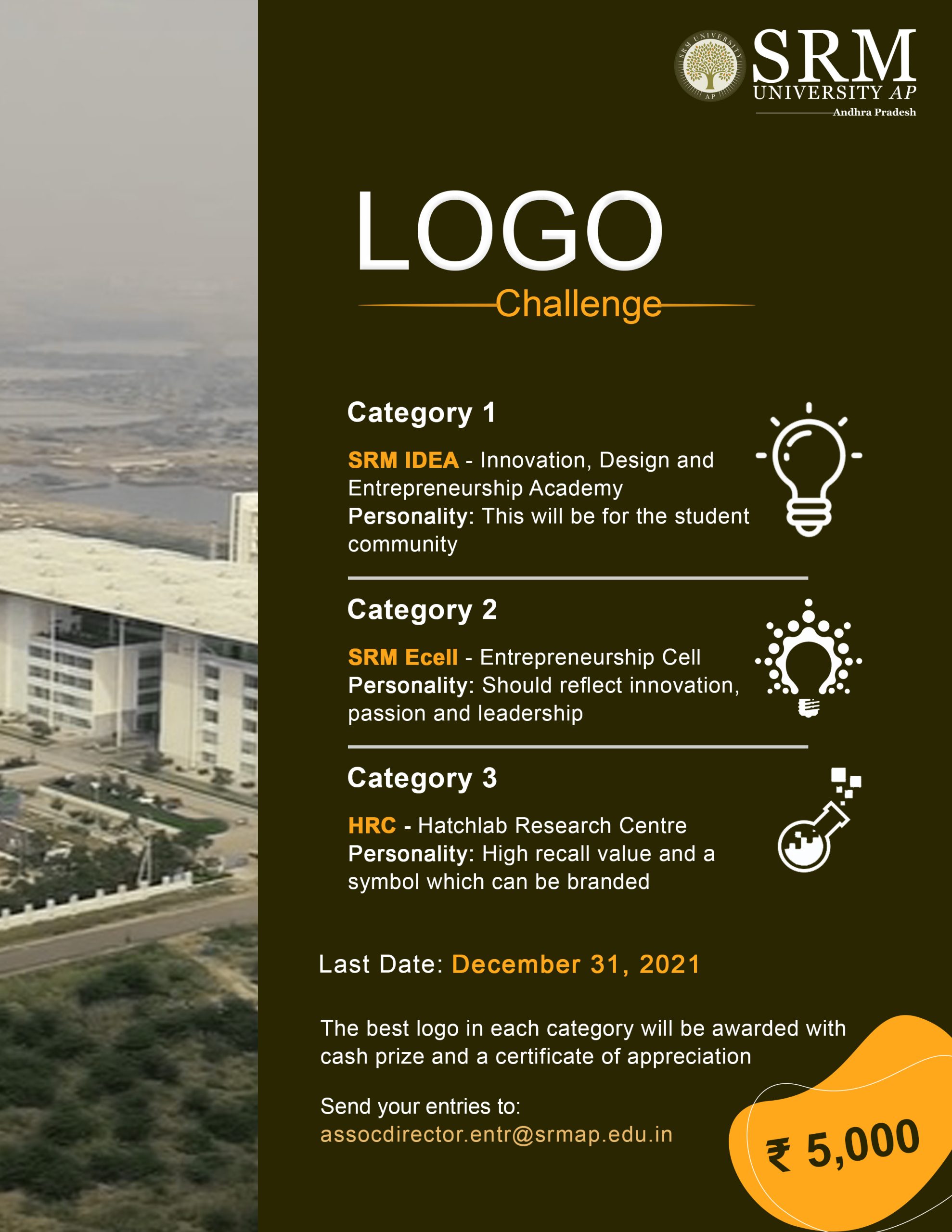Eminent Lecture Series with Prof Haribabu Ejnavarzala
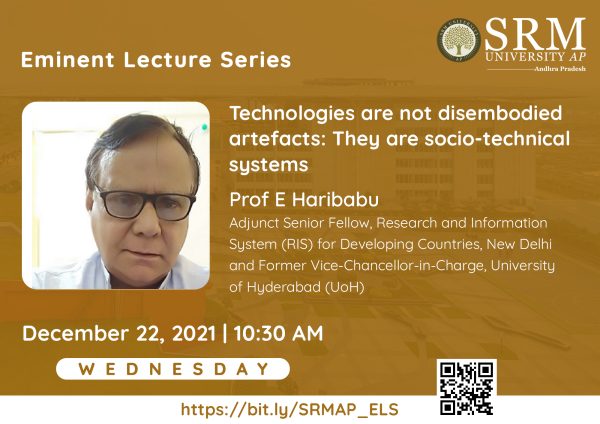 Technology is deeply integrated into the human society. The Department of Management Studies invites you all to the Eminent Lecture Series with our guest Prof Haribabu Ejnavarzala, for an engaging session on the economic, social, and other impacts of new technology on our lives.
Technology is deeply integrated into the human society. The Department of Management Studies invites you all to the Eminent Lecture Series with our guest Prof Haribabu Ejnavarzala, for an engaging session on the economic, social, and other impacts of new technology on our lives.
Topic: Technologies are not disembodied artefacts: They are socio-technical systems
Date: December 22, 2021
Time: 10.30 am IST
About the Speaker:
Prof Haribabu Ejnavarzala is an Adjunct Senior Fellow, Research, and Information System (RIS) for Developing Countries, New Delhi and Former Vice-Chancellor-in-Charge, University of Hyderabad (UoH).
Abstract:
Technologies are socio-technical systems. The forces that shape the development of technology are social, economic, cultural, political, and ethical in nature. A technology introduced into society has consequences for interrelated domains -social (class, caste, gender relations), economic, political, cultural, and ethical. Technologies also affect the environment- water, soil, air, and non-human forms of life. In other words, technologies are embedded in societal and environmental contexts. In order to understand the values and interests underlying the construction of technological innovation and its consequences, we have to unpack the design of a given technology and its associated practices. Technologies are intricately related to the interests and meaning structures of stakeholders. In this lecture, I focus on genetic modification of crops to show that it is a socio-technical system deeply connected with interests, sometimes conflicting interests, and meanings of relevant stakeholders – farmers who use the technology, consumers of products produced by genetic modification of crops, government, regulatory agencies, judiciary, and civil society organisations in the Indian context. In conclusion, I argue that innovations that promote equity, inclusivity and justice will have more significant social acceptability.
Please join this spirited session with our eminent guest on December 22, 2021, at 10.30 am IST for the next edition of Eminent Lecture Series.
- Published in Departmental Events, Events, Paari Current Happenings
Higher education abroad might be easier than you think
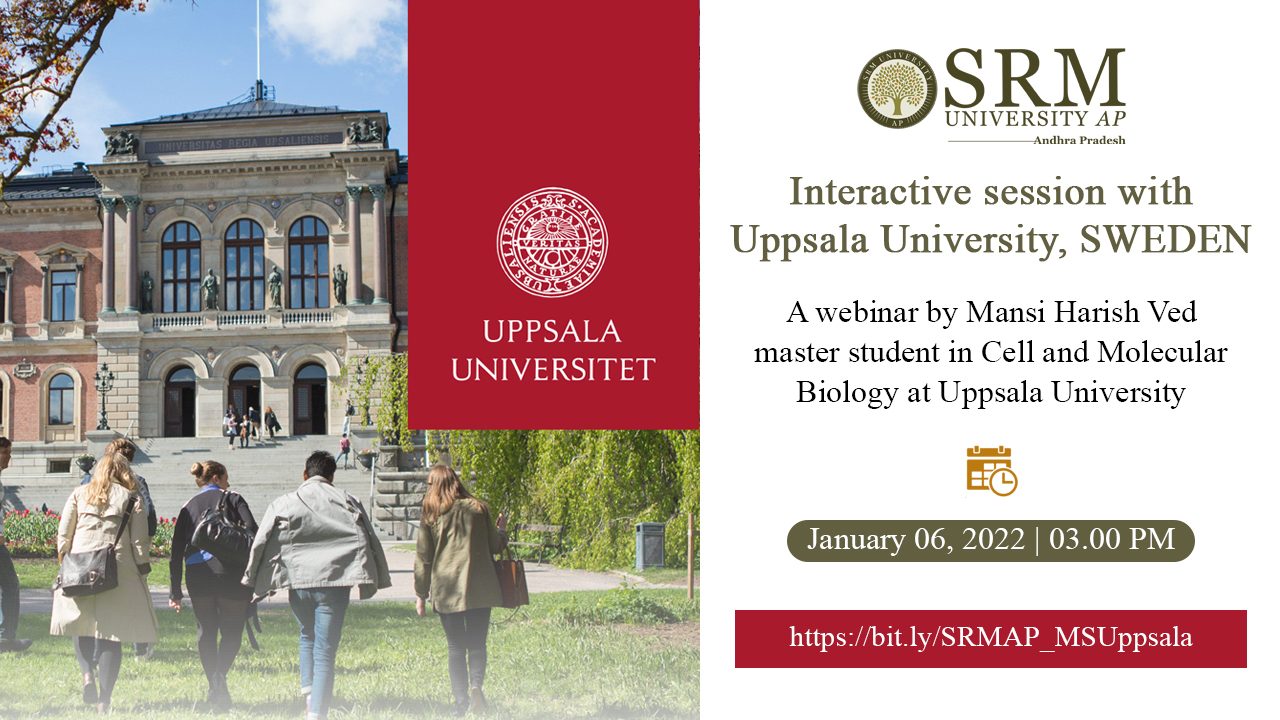 Do you dream about studying at a high-ranking university abroad?
Do you dream about studying at a high-ranking university abroad?
The Department of International Relations has arranged an exciting session to help you realize your higher education abroad dreams. From the land of the Northern Lights, Uppsala University (Sweden) brings you an insight into the opportunities available at one of the most reputed institutes in the world.
Mansi Harish Ved, master student in Cell and Molecular Biology, will join us from Uppsala University and share her experience to help others pursue their studying abroad dream.
Join the webinar on January 06, 2022, at 3.00 pm IST and see what your life at Uppsala University could look like. This session might be the ticket to your dreams of receiving higher education abroad.
- Published in Events, International Relations, IR-Events
Dr Chennupati Jagadish on Semiconductor Nanostructures for Optoelectronics Applications
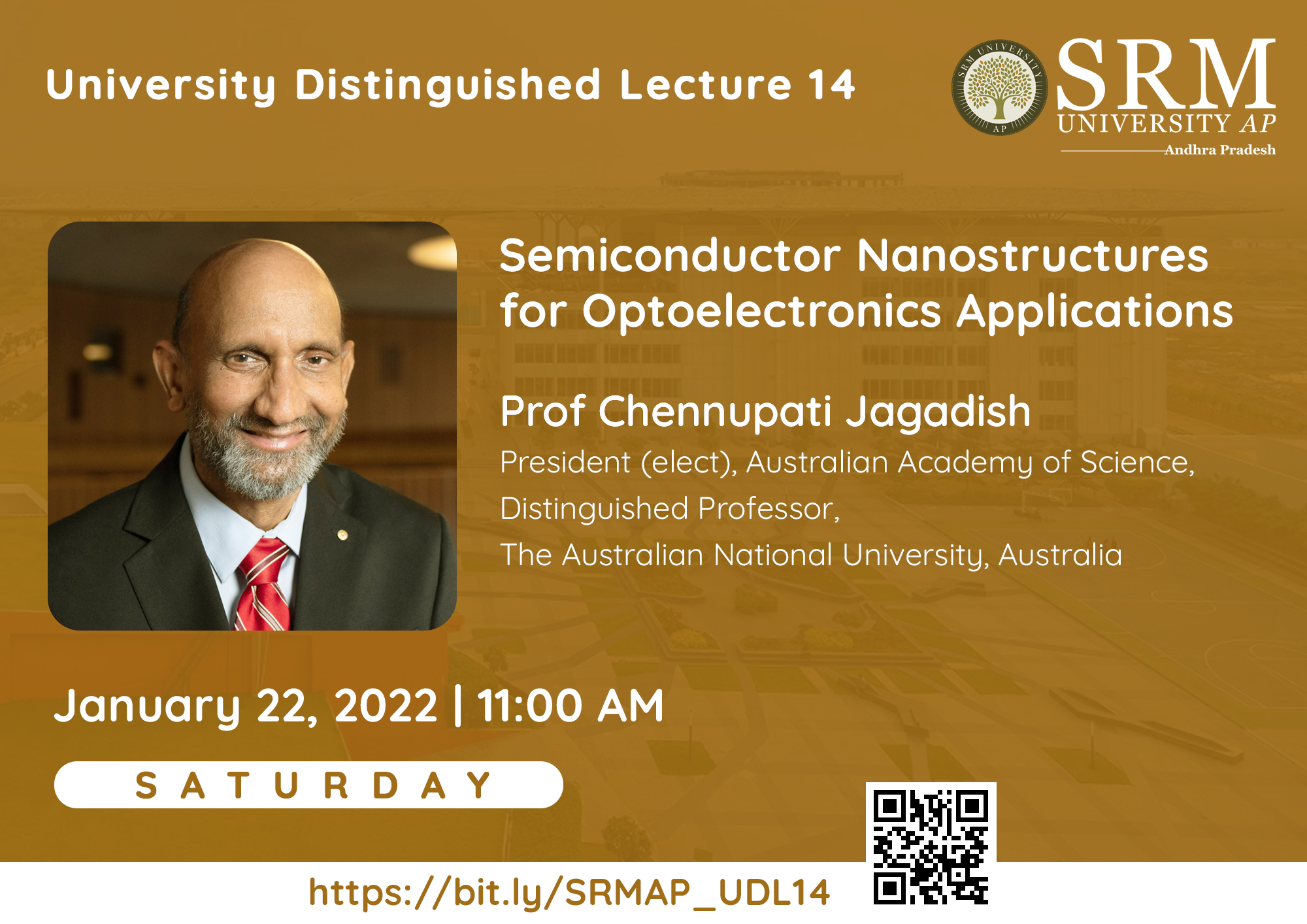 In the next installment of the University Distinguished Lecture, SRM University-AP brings to you Dr Chennupati Jagadish, a distinguished professor in Physics in the Research School of Physics and Engineering at the Australian National University. He leads the Semiconductor Optoelectronics and Nanotechnology Group as its head since its establishment in 1990 by him.
In the next installment of the University Distinguished Lecture, SRM University-AP brings to you Dr Chennupati Jagadish, a distinguished professor in Physics in the Research School of Physics and Engineering at the Australian National University. He leads the Semiconductor Optoelectronics and Nanotechnology Group as its head since its establishment in 1990 by him.
Date: January 22, 2022 (Saturday)
Time: 11.00 am IST
About the Topic:
Semiconductors have played an important role in the development of information and communications technology, solar cells, solid state lighting. Nanowires are considered as building blocks for the next generation electronics and optoelectronics. In this talk, I will present the results on optoelectronic devices such as lasers/LEDs, THz detectors, energy devices such as solar cells, photoelectrochemical (PEC) water splitting and Neuro-electrodes. Future prospects of the semiconductor nanowires will be discussed.
About the Speaker:
Dr Chennupati Jagadish obtained his Bachelor of Science degree in Physics from the Acharya Nagarjuna University in Tenali, Andhra Pradesh in the year 1977. He received his Master of Science in Applied Physics with a specialisation in Electronics from Andhra University in the year 1980. He acquired his PhD in Physics, by working on ‘Semiconducting Thin Films’, from the University of Delhi in the year 1986. He also held the position of a post-doctoral fellow in the Queens University.
Dr Jagadish moved to the Australian National University in the year 1990 and joined the newly established Department of Electronic Materials Engineering in the Research School of Physics and Engineering. He was the Vice-President and Secretary at the Australian Academy of Science for Physical Sciences for four years.
Committed to his role as an academician, Dr Jagadish also holds many honorary and guest faculty positions around the world in leading Universities such as the Oxford University, the Cambridge University, South Central University (The Republic of China), the University of Electronic Science and Technology of China, the University of Tokyo and the Taiwan National University to name a few.
He makes a frequent appearance, by invitation, to various international conferences and seminars on Material Sciences, Electronics, Quantum Electronics, Semiconductors, Physics, Photonics, and Material Sciences. As an active member of the Material Research Society, IEEE, he has delivered many talks and guest lectures as well as organised several sessions in MRS, IEEE meetings throughout the world.
Dr Chennupati Jagadish is currently the Editor-in-Chief for Applied Physics Reviews. He was earlier the Editor-in-Chief for Progress in Quantum electronics and Co-Editor-in-chief for the International Journal of High-Speed Electronics and Systems. He is also the Editor for the Journal of Semiconductor Technology and Science, Springer Series in Material Science, Springer Series in Nanoptics and Nanophotonics, Elsevier Series in Semiconductors and Semimetals, IEEE Electron Device Letters, and Light: Science and Applications of Nature Publishing Group. He is a member of the Editorial Boards of over 20 journals including ACS Nano, Physica Status Solidi: Rapid Res. Lett., IEEE Nanotechnology Magazine, IEEE Photonics Journal, Solid State Electronics, among others.
Dr Jagadish holds many laurels to his name. He became a Champion of the Order of Australia for his eminent contributions to Physics and Engineering at the Australia Day Honours 2016. He has acquired the IEEE Pioneer Award in Nanotechnology (2015), the Walter Boas Medal from the Australian Institute of Physics (2013) and the Thomas Ranken Lyle Medal from the Australian Academy of Science (2019).
He became an elected Fellow of the American Physical Society (2003). In 2020, he also became an elected member of the National Academy of Engineering for his contributions to the nanotechnology of optoelectronic devices. The Australian Research Council awarded him with the Federation Fellowship (2004-09) and with the Laureate Fellowship (2009-14).
It would be a privilege to have Dr Chennupati Jagadish, an astoundingly celebrated research personality, in our midst. We urge everyone to make the most of this opportunity. The University Distinguished Lecture (UDL) hosted by SRM University-AP is attended by about 2000 members from IITs, NITs, IISERs, Universities/Institutions, CSIR, DST, DBT, DRDO, DAE, ISRO, NARL, MoES and several others from different parts of the country.
SRM University-AP cordially invites everyone to the fourteenth University distinguished Lecture on January 22, 2022, Saturday at 11.00 am IST.
Register to Join: https://bit.ly/SRMAP_UDL14 (Registration Closed)
- Published in Events, Research Events, University Distinguished Lecture
Innovation for sustainable smart solutions
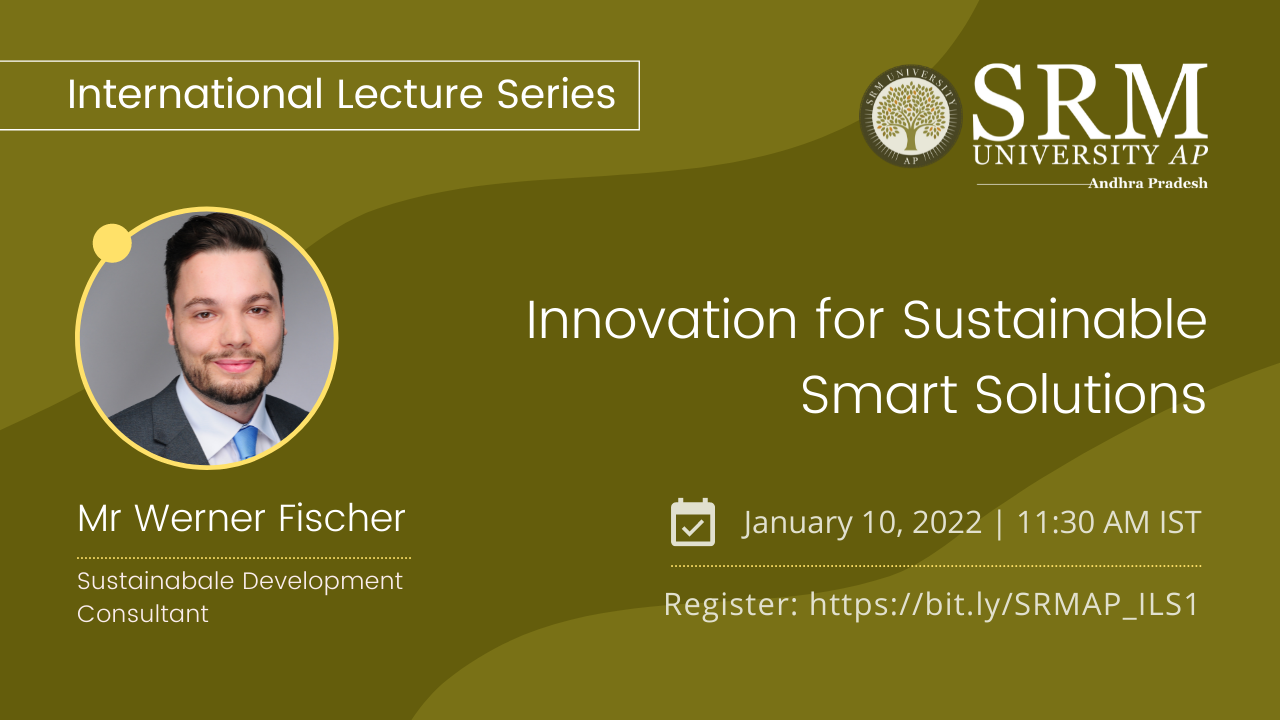
Speakers from across the globe are invited for the International Lecture Series organised by the Office of International Relations and Higher Studies, SRM University-AP. The latest session of the series aims to provide insight into how new technological developments are changing the face of society. Mr Werner Fischer, Sustainable Development Consultant, will engage the participants on the topic “Innovation for Sustainable Smart Solutions” on January 10, 2022, at 11.30 am.
The lecture aims to provide a multidisciplinary approach to environmental studies, urban planning, and development. Focus on inventive technical developments is essential for the establishment of sustainable green societies. Such conversations with experts intend to challenge academic norms, examine established knowledge-power relationships, and shine a light on issues of equality, equity, diversity, and inclusion.
Speaker’s Profile:
Mr Werner Fischer, Sustainable Development Consultant
Co-Author of “How to Create Smart Villages” book
Advisor at Brightmind.io
Advisor at UC Berkeley-led private-public sector, Rebuilding India Initiative.
Worked as a Director of research for the Smart Village Movement in India
BSc in Business Studies and Economics from the University of Konstanz
MSc in Technology Management (M.Sc.) from the Braunschweig University of Technology, Germany
Business Studies at University of California, Berkeley, Haas School of Business
All are invited to join the session on January 10, 2022, at 11.30 am.


